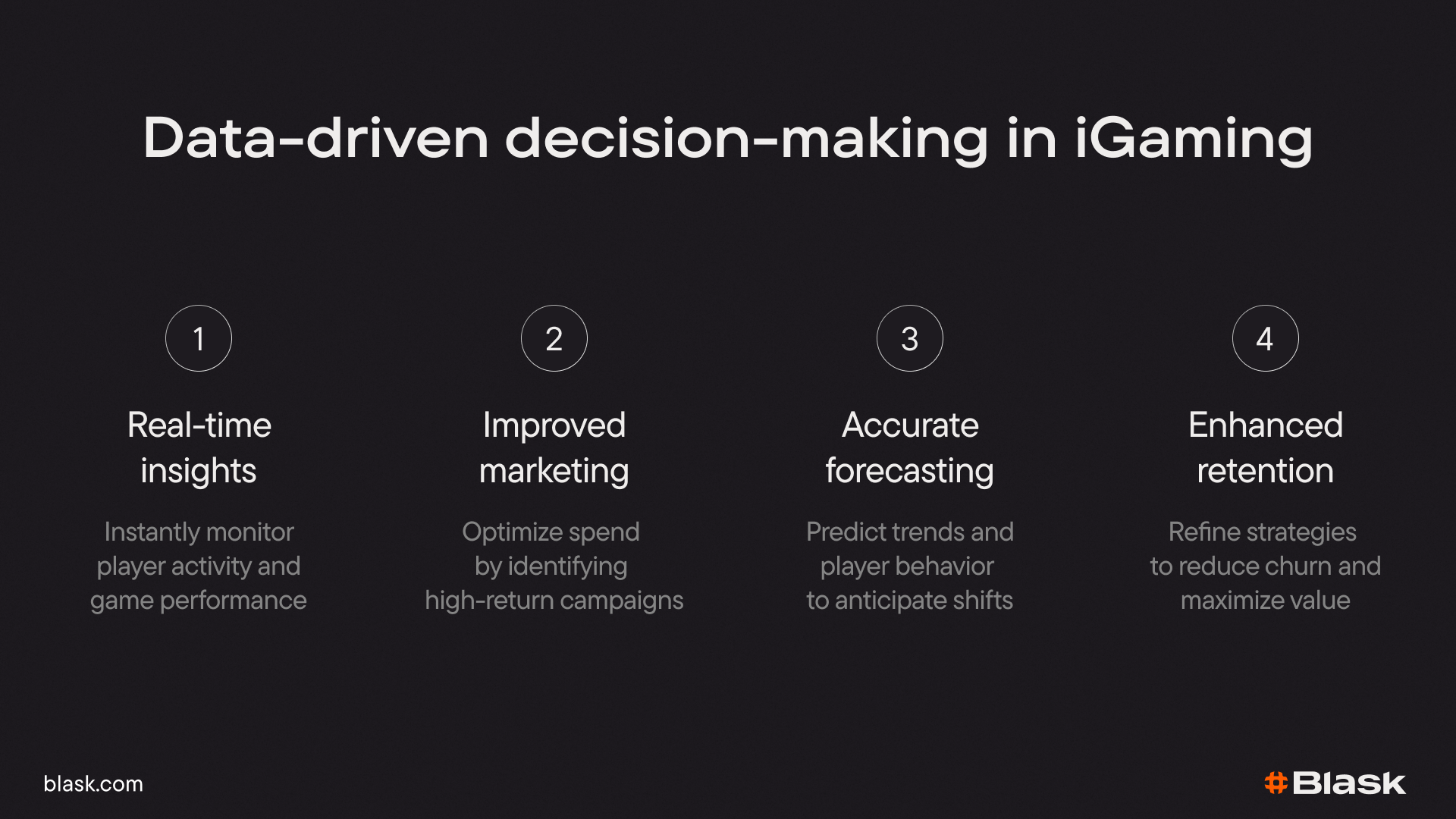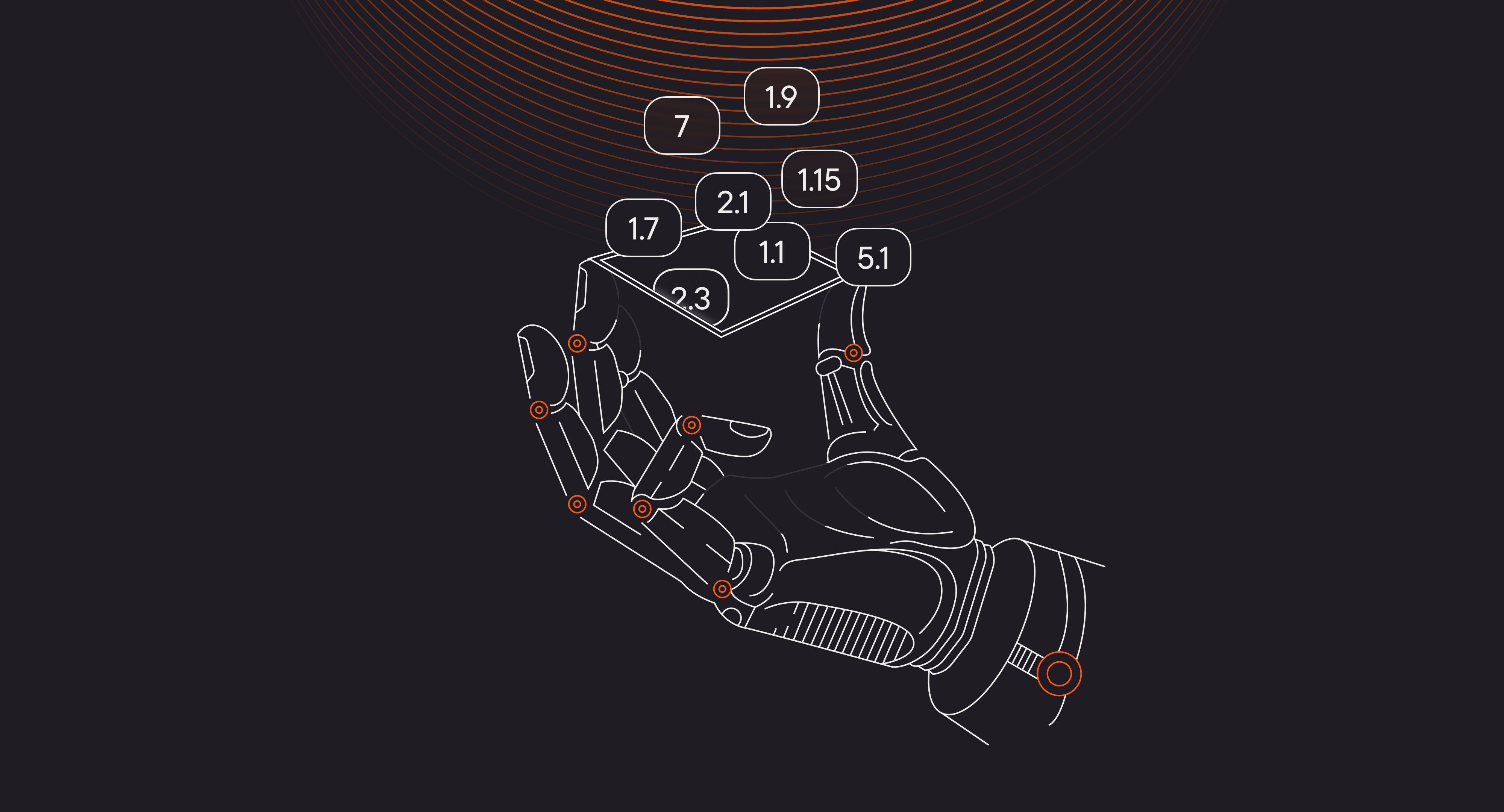The real game-changer in iGaming industry isn’t just innovation — it's the ability to make smarter, data-backed decisions. What does the future hold for operators who leverage data effectively — and what happens to those who don’t? Keep reading to find out how data-driven decisions are revolutionizing the way iGaming companies thrive in this dynamic industry.
The dawn of AI in iGaming
Artificial intelligence isn’t a futuristic concept anymore — it’s here, and it’s changing the game for iGaming companies. From predicting player behavior to optimizing marketing strategies and personalizing user experiences, AI is quickly becoming the secret weapon in the iGaming industry’s arsenal.
The global iGaming market, which is already valued in the billions, is projected to continue growing at a staggering pace. However, with growth comes competition, and that’s where AI steps in.
Operators are turning to AI not just to keep up, but to get ahead. And in an industry where player retention is paramount, the ability to predict customer behavior, detect fraud, and personalize experiences has become a game-changer.
Key benefits of data-driven decision-making

Predicting the unpredictable
One of the most powerful applications of AI in iGaming is its ability to predict player behavior. At its core, AI is all about data.
Massive volumes of data, generated by players as they engage with games, place bets, and interact with platforms, provide a goldmine of insights. By applying machine learning algorithms to this data, operators can uncover patterns and trends that would be impossible to detect with traditional analytics.
Consider the case of a large online casino. Using AI, the casino can analyze every click, wager, and game played by users, allowing it to predict with remarkable accuracy when a player is likely to churn or stop playing. This information enables the operator to step in before the player leaves, offering targeted promotions or personalized experiences designed to keep them engaged.
“AI gives us the ability to anticipate player needs, spot problems before they happen, and act on that knowledge in real-time,” says Eamon Murphy, a senior data scientist at one of Europe’s leading iGaming platforms. “In a world where players have endless options at their fingertips, this predictive power is invaluable.”
Personalizing the player experience
Personalization is another area where AI is making a significant impact. In the past, iGaming platforms operated with a one-size-fits-all approach to promotions, bonuses, and game recommendations.
Today, AI allows operators to move away from generic offers and deliver a hyper-personalized experience to each player.
For example, AI algorithms can assess a player's history — what games they prefer, how much they bet, and even their social media activity—to tailor offers specifically designed for them. Whether it’s suggesting a new slot game based on past preferences or offering a bonus at just the right time, AI helps operators connect with players in ways that were previously unimaginable.
Fraud prevention: AI’s watchful eye
In an industry where money is constantly flowing, the risk of fraud is ever-present. But AI is proving to be an invaluable tool in the fight against fraudulent activity. By continuously monitoring player behavior, AI systems can detect unusual patterns that may indicate fraud. Whether it’s spotting an account that’s been compromised or identifying suspicious betting activity, AI’s real-time analysis helps operators stay one step ahead.
For example, AI can flag a player who suddenly starts placing large bets after a period of inactivity, a common indicator of account takeover. Similarly, AI can analyze betting patterns to detect syndicates or match-fixing, areas where human analysis simply can’t keep up with the volume of data.
"The level of sophistication fraudsters use today means we can’t rely on traditional methods of detection," says Eamon Murphy. "AI offers a much more scalable, proactive approach that helps us detect and prevent fraudulent activity before it escalates."
Optimizing marketing campaigns and benchmarking
Another area where AI is reshaping iGaming is in marketing. With the massive volume of players and games, marketing teams can quickly become overwhelmed with data.
Here, AI acts as a force multiplier, helping operators optimize their marketing campaigns and reach the right audience with the right message.
By analyzing past campaigns and player behavior, AI can help marketers fine-tune their strategies, segment players more effectively, and predict which messages will resonate with specific groups.
Whether it's an email campaign, an in-game promotion, or a targeted ad on social media, AI ensures that every marketing effort is as effective as possible.
Key metrics for informed decision-making in iGaming
To make well-informed decisions, operators need to track several critical metrics that provide insights into performance, market position, and future opportunities. Here’s a breakdown of the most important metrics every operator should monitor.
1. First-time deposits and eFTD
First-Time Deposits (FTD) represent the first deposit a player makes after signing up, a crucial milestone in converting a visitor into a paying customer. eFTD is a metric from Blask that uses AI to estimate First-Time Deposits for each brand in the market. This allows you to compare your internal metrics with Blask's to assess the accuracy of your analytics.

2. Gross Gaming Revenue and eGGR
Gross Gaming Revenue (GGR) represents total revenue generated from player wagers minus winnings paid out. eGGR, like eFTD, is an AI-powered metric in Blask that estimates the current Gross Gaming Revenue for brands and their competitors. While it doesn't forecast future revenue, eGGR is a crucial tool for several reasons.
- Benchmark accuracy
- Competitive analysis
- Market growth evaluation
- Performance tracking
3. Relative Market Share
Relative Market Share provides a percentage-based comparison of your market position against competitors, helping you assess market penetration.
How to use Relative Market Share in decision-making:
- Competitive analysis:
Identify gaps and opportunities for growth. - Brand positioning:
Inform decisions on marketing strategies and product offerings. - Market expansion:
Target regions where there's potential for growth.
A smarter, faster future
The adoption of AI in iGaming is only set to accelerate in the coming years. With advancements in machine learning, natural language processing, and predictive analytics, AI is evolving at an exponential rate, unlocking new opportunities for operators.
These bots, powered by natural language processing, are becoming more intelligent by the day, further enhancing the player experience.
The key to success in the future of iGaming will be how well operators can integrate AI into their operations and use it to make smarter, faster decisions.
Whether it's enhancing the player experience, optimizing marketing strategies, or preventing fraud, AI will continue to drive the industry forward, providing operators with the edge they need to stay ahead of the competition.
As one industry insider put it, “In iGaming, AI isn’t just the future—it’s the present. The sooner you embrace it, the better positioned you’ll be to thrive in a rapidly changing landscape.”
And for those who do, the rewards could be as high as any jackpot.
